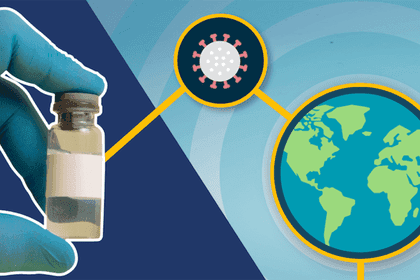
What are 'adverse events' and 'emergency use authorisation' in relation to vaccination?
While vaccines are the safest way to prevent the spread of infectious disease, a tiny proportion of those vaccinated may experience an adverse event. Here, we explain how often this happens and why.

Wellcome
What are 'Adverse Events Following Immunisation' (AEFIs)?
Adverse events are unfavourable and unintended medical outcomes that occur after a vaccination. They may be related to – caused by – the vaccine or may be unrelated to – not caused by – the vaccine.
It is normal for these events to occasionally occur, even when a vaccine has been approved as safe and effective.
For example, the hepatitis B vaccine has been approved since the 1980s. It is considered extremely safe and is on the World Health Organization Model List of Essential Medicines. But mild adverse events (such as headache and soreness where injected) occur in 3 in 100 vaccine recipients, and last just 1-2 days. Severe adverse events associated with the vaccine are incredibly rare, at just 1.1 per 1 million vaccine recipients.
How are they monitored?
Adverse events are proactively monitored throughout vaccine development and rollout. Policies and systems are in place that require vaccine manufacturers and clinicians to report these events to keep regulatory authorities informed on the vaccine’s safety (for example the Vaccine Adverse Event Reporting System in the US, and the Yellow Card Scheme in the UK).
Studies are done to determine whether adverse events are 'related' or 'unrelated' to administration of the vaccine:
- Related event: when an unintended medical outcome happens to someone who’s taken a vaccine, as a result of taking that vaccine. For example if you were watching your favourite TV show, causing the sitting room light fuse to blow. These can range from very mild side effects (like headache or soreness where vaccinated) to more severe reactions (such as allergic reactions). They can, very rarely, be due to quality faults by the manufacturer, or errors when receiving the vaccine.
- Unrelated event: when an unintended medical outcome happens to someone who’s taken a vaccine, but not because of the vaccine, it just happened coincidentally. For example if you were watching your favourite TV show and at the same time a pipe burst in your kitchen.
How do we know Covid-19 vaccines are safe and how are they authorised for use?
Extensive global collaboration and massive investment has allowed vaccine development timelines to be sped up without affecting safety.
Due to the life-threatening nature of Covid-19, especially for vulnerable people like frontline workers and the elderly, Emergency Use Authorisation (EUA) of Covid-19 vaccines are being offered in some countries.
EUA is granted by national regulatory authorities like the Medicines and Health Regulatory Authority (MHRA) for the UK, and the Federal Drug Administration (FDA) for the US. It allows unlicensed vaccines to be used in an emergency to prevent serious disease, provided important safety, efficacy and manufacturing criteria are met. An EUA can be submitted based on interim phase 3 data if it meets the rigorous standards set by the regulatory authority, which determine whether the benefits of the vaccine outweigh the risks.
Monitoring of vaccine recipients, including follow-up of adverse events, continues after an EUA is approved to validate continuation of the EUA. Clinical trials and further evaluation also continue to collect additional safety and effectivity data. All of this information will be used to gain final (non-emergency use) regulatory approval.
The World Health Organization (WHO) can also recommend a vaccine for emergency use through their Emergency Use Listing Procedure (EUL). This process involves stringent safety, efficacy and risk-versus-benefit analysis. It requires companies to continue to generate data to enable full licensure and WHO prequalification of the vaccine. Once issued, a EUL opens the door for countries to speed up their own regulatory approval processes to import and administer the vaccine.
What adverse events are likely with the Covid-19 vaccines?
With so many needing protection from Covid-19, this will be the largest vaccine rollout in human history.
It is therefore likely that we will see some adverse events as the rollout progresses. It’s also important to remember that it can take weeks to build immunity after vaccination, and that no vaccine is 100% effective.
With clinical trials having tested for and identified common adverse events, the risk of severe adverse events is expected to be tiny compared to the benefits from vaccination.
So far, early data suggests that one potential adverse event we might see is an allergic reaction, though this is considered rare and is being investigated further.
In very rare and extreme situations when there is a notable safety concern, a vaccine could be suspended, recalled, or replaced. Processes already exist to do this quickly if necessary.
These processes ensure that any adverse events following vaccination are monitored, that the patient receives the care they need, and that further vaccination is stopped if a significant risk is posed.
Case study: Blood clots after vaccination
The Oxford/AstraZeneca vaccine has been linked to a small number of reports of rare blood clots combined with low platelet counts (platelets are cell fragments in our blood that help it to clot). Regulators are continuously combing through the details of the rare clots that have occurred to work out whether they might be caused by vaccination.
How many cases have there been?
As of 31 March 2021, The UK Medicines and Healthcare products Regulatory Agency (MHRA) reported 79 cases of blood clots combined with low platelets, including 19 deaths, following more than 20 million doses of the Oxford/AstraZeneca vaccine. While the European Medicines Agency (EMA) have reviewed 86 European cases, following more than 25 million doses.
What are the risks of blood clots?
The MHRA has said that the risk of this type of blood clot is around four in one million people who receive the vaccine (0.0004%).
This is compared to a 0.05% risk of clotting after taking the contraceptive pill, and a 0.1% risk of clotting from flights.
What’s the latest official guidance?
With infection levels rapidly rising across the world, the MHRA, along with the EMA and the World Health Organization, have all said people should continue taking the Oxford/AstraZeneca vaccine because its benefits in preventing Covid infection far outweigh any risks.
The extensive safety measures for dealing with adverse events mean that even if there are a few during the vaccination rollout, they will be identified and managed, while still preventing a colossal number of deaths and hospitalisations caused by Covid-19.
This explainer was originally published in January 2021 and updated in April 2021.

